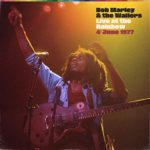Bob Marley was a self-exiled man living in London in the summer of 1977 after an assassination attempt in his Jamaican homeland in December of ‘76 left the reggae icon feeling far less than secure on the island. Where he and his band, the Wailers, were quite secure was in the studio or onstage on another island: Great Britain. Marley recorded arguably his most acclaimed album, Exodus, while holed up in England, and released it on June 3, 1977. The next day, he and the Wailers performed during a multi-night stand at London’s Rainbow Theatre.
The limited-edition double LP of that June 4, ‘77 appearance comes now, for the first time as a full audio release; the show, edited, was previously available as a video, Live at the Rainbow. As part of the ongoing celebration of Marley’s 75th birthday, both the video of the concert and now the album have been issued as versions fully restored with their complete and proper running order; the video is currently available on YouTube. And with its restoration, and with complete and proper context, Marley’s inspired effort finally can be wholly appreciated for the vibrant and fearless entity it was at the time.
The set plays like a run of Marley at his most insightful, opening on a nod to home with “Trenchtown Rock,” and its stanzas of resilience: One good thing about music/When it hits, you feel no pain. Though, Marley isn’t without his own musical weaponry, following with “Rebel Music” and “Burnin’ and Lootin’.” It’s amazing, and sad, in the summer of 2020 how apposite and alive these commentaries remain. In fact, the songlist bleeds from one relevant, socially-conscious missive to the next, eventually offering the Exodus title track as a closing solution.
There is a slight kink in the program- the Wailers and Marley out of step on a musical segueway during the newly worked-up “War-No More Trouble” couplet- but it’s a minor quibble. Otherwise, the Barrett brothers’ rhythm section is wickedly telepathic, with Junior Marvin’s guitar work serpentine and supple, stirring Marley and his I-Threes to sing the ghetto gospel as true believers, servants, and survivors. Marley may have been in exile, but he wasn’t hiding his mission or his message. Everything was here in plain sight on that June night, rattling the Rainbow to its bedrock.



No Comments comments associated with this post